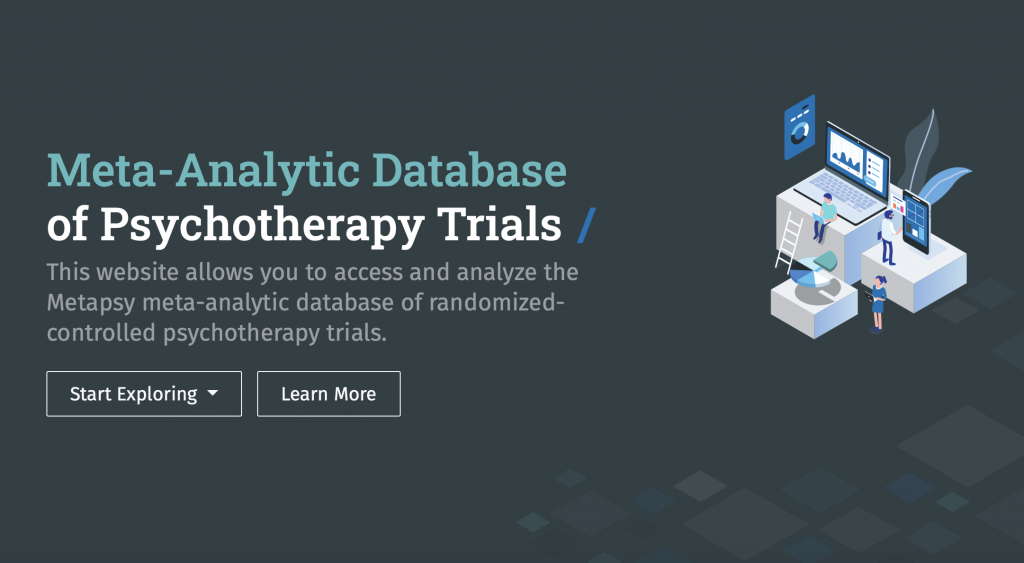Psychological treatment of depression #DepressionSolvingTheToll part 3

In the past 50 years, more than 950 randomised controlled trials have examined the effects of psychological treatment of depression. What has this huge body of research taught us about the effects of these treatments in different age and target groups and settings? Which talking treatments are most effective, how can they be delivered, how many sessions are needed and how do they compare to antidepressants? All this research has resulted in a great deal of knowledge, but there are also several highly relevant questions that have not yet been answered.
In this blog I will give a brief overview of this field, and what can be done to further improve the effects of these treatments. I have also presented a more extensive overview in the webinar that you can watch below.
Meta-Analytic Research Domains
In the past 15 years, I have coordinated a series of more than 100 meta-analyses on psychological treatments (Cuijpers et al., 2023a). This was much broader than a ‘simple’ meta-analysis. We have conducted regular searches in bibliographic databases on any randomised controlled trial examining the effects of psychological treatments, regardless of the type of treatment, delivery format, age-group, target group, or comparator. We now update these searches every 4 months. We call this kind of broad living systematic reviews ‘meta-analytic research domains’ (MARDs) (Cuijpers et al., 2022). These MARDs are broader than (network) meta-analyses and superior to umbrella reviews, because of the consistent methodology across all subdomains. A MARD also provides a comprehensive overview of a complete field of research. Our MARD on psychological treatments of depression is also open access at www.metapsy.org, where anyone can run full meta-analyses on subsets of trials without any additional software.

Visit metapsy.org to access the free Metapsy meta-analytic database of randomized-controlled psychotherapy trials.
Which psychotherapies are effective for depression?
Our MARD on psychological treatments for depression has first shown that many different types of psychological treatment are effective. Cognitive behaviour therapy (CBT), interpersonal psychotherapy (IPT), psychodynamic therapy, problem-solving therapy (PST), behavioural activation (BA), life-review, 3rd wave therapies (such as acceptance and commitment therapy, mindfulness-based therapy), and counseling have all been found to be effective compared to waitlist, usual care and other control groups (Cuijpers et al., 2021a). The effects are small to moderate and remain significant up to one year after treatment. The effects do not significantly differ from each other, except maybe for counseling, but that may also be an artefact because it is often designed as a control group. When we look at the absolute outcomes, about 41% of participants respond to treatment (50% symptom reduction) (Cuijpers et al., 2021b). In waitlist and usual care control groups 16 to 17% respond.
Therapies can be applied in an individual format, but also in groups, by telephone, digitally or in other types of guided self-help, as long as there is human support available (Cuijpers et al., 2019). There are no significant differences between these formats. Without human support the interventions are also effective, but the size of the effects is much smaller. The number of sessions or total contact time is not associated with the effect size, but more sessions per week results in larger effects than one session per week.

Many different types of psychotherapy are effective for depression. The effects are small to moderate and remain significant up to one year after treatment. About 41% of participants respond to treatment.
For whom are psychotherapies effective?
There are no significant differences between therapies in adult age groups (ranging from young adults to older adults of 75 years and above), but the effects are significantly smaller in children and adolescents. The therapies also have comparable effects in different target groups, such as people with general medical disorders, college students and women with perinatal depression. The effects are somewhat smaller in primary care compared to specialised care, probably because people in the control conditions get better more often in primary care (Cuijpers et al., 2023b). Maybe the effects are also somewhat smaller in chronic depression. The effects are also smaller in people with depression and comorbid substance use problems, but not when they have comorbid anxiety or insomnia.

Psychotherapies work well across all adult age groups, but the effects are significantly smaller in children and adolescents.
Risk of bias
An important problem is that many trials on psychological treatments suffer from at least some kind of risk of bias. About 80% of the trials have problems with, for example, the randomisation, the assessment of outcome, or the correct handling of drop-outs. Also, waiting lists may overestimate outcomes. Publication bias – the problem that negative outcomes are not published – is another important problem of psychotherapy research. When the outcomes of meta-analyses adjust for such problems, the effect sizes are about half as large as without these adjustments.

The vast majority of psychotherapy trials (around 80%) suffer from methodological problems that make their findings much less reliable.
Comparison with antidepressants
In the short term, the effects of psychotherapy are comparable to those of antidepressant drugs (Cuijpers et al., 2020). However, in the longer term, psychotherapy is probably more effective. The combination of therapy and medication is more effective than either therapy or medication alone, both in the short- and the long-term. There is no indication that the effects of therapy are smaller when patients are using medication for depression.

For many people with depression, the most effective treatment will be a combination of psychotherapy and medication.
Who benefits from treatments and who does not?
One problem of conventional meta-analyses is that they cannot very well examine which characteristics of patients are associated with better outcomes. This cannot be done because personal characteristics can only be examined at the aggregated study-level. Single trials usually cannot examine such characteristics, because these trials generally only have sufficient statistical power to find the effects of an intervention, whereas examining such personal characteristics requires many more participants in the trial.
‘Individual patient data’ (IPD) meta-analyses can examine such personal characteristics. In IPD meta-analyses, the primary data of randomised controlled trials are collected and merged into one big datafile. This allows us to compare different treatments to each other. These studies also provide evidence on rare outcomes, such as deterioration. It goes beyond this blog to describe all the outcomes of these IPD meta-analyses. But in one important IPD meta-analyses, it was shown for example that in mild depression both guided and unguided digital interventions are effective, with no significant difference between them. However, in more severe depression, guided interventions are more effective (Karyotaki et al., 2021).

Individual patient data meta-analyses allow us to compare different treatments more reliably, and have shown for example, that in mild depression both guided and unguided digital interventions are effective, with no significant difference between them. [Read more about digital interventions for depression in Pim’s blog from last week].
How can treatments be improved?
Psychological treatments are effective and evidence-based, but that does not mean that everyone gets better when they receive such a treatment. Almost 60% of those who receive treatment do not respond, and 16 to 17% of those who do not get treatment do respond. This means that only about one quarter of those who get treatment actually benefit. Furthermore, treatments have not improved over time. The effects found in the early trials are comparable to those found in more recent trials. It is therefore important to improve the outcomes of therapies.
That can be done in several ways. One way is to conduct more research on sequential treatments. All therapies have comparable effects, but we do not know who benefits from which treatment and who will respond to one specific therapy, but not to another. That means basically we can start with any therapy. But we also do not know what the best treatment is when someone does not respond. If we assume that the next treatments are as effective as the first one, we need to give up to 10 treatments to some patients if we want them all to get better. The average number of treatments is 2.5. But we hardly know anything about sequential treatments; what to start with, what treatment might work best as a next step, and so forth.
We do not need more research on new therapies. Over the years several new treatments have been introduced with the promise that they are better than the existing ones, but that was never true and no new treatment has ever been shown to be more effective than earlier ones. If new therapies are developed, they should first show that they are indeed more effective than other therapies, or have other advantages (e.g. briefer, easier to implement, better suited for a complicated target group, etc).
Instead of focusing on new therapies, it is much more sensible to focus on ‘difficult’ subgroups, such as people with chronic depression or people with comorbid personality disorders, substance use disorders or other comorbidities, or for example on relapse prevention. It is also important to focus on more process-oriented possibilities to improve the effects of outcomes, such as an increase in the frequency of sessions or regular feedback from patients.

We do not need more research on new psychotherapies for depression. No new psychotherapy has ever been shown to be more effective than earlier ones. Let’s focus on reaching the people who really need help.
This blog is part of #DepressionSolvingTheToll series written by Pim Cuijpers. Catch up on all of blogs and webinars in this series.
References
Cuijpers P, Noma H, Karyotaki E, Cipriani A, Furukawa T (2019). Individual, group, telephone, self-help and internet-based cognitive behavior therapy for adult depression; A network meta-analysis of delivery methods. JAMA Psychiatry, 76, 700-707.
Cuijpers P, Quero S, Noma H, Ciharova M, Miguel C, Karyotaki E, Cipriani A, Cristea I, Furukawa TA(2021a). Psychotherapies for depression: a network meta-analysis covering efficacy, acceptability and long-term outcomes of all main treatment types. World Psychiatry, 20, 283-293.
Cuijpers P, Karyotaki E, Ciharova M, Miguel C, Noma H, Furukawa TA (2021b). The effects of psychotherapies for depression on response, remission, reliable change, and deterioration: A meta-analysis. Acta Psychiatrica Scandinavica, 144, 288–299
Cuijpers P, Miguel C, Papola D, Harrer M, Karyotaki E (2022). From living systematic reviews to meta-analytical research domains. Evidence-Based Mental Health, 25, 145–147.
Cuijpers P, Miguel C, Harrer M, Plessen CY, Ciharova M, Papola D, Ebert D, Karyotaki E (2023a). Psychological treatment of depression: A systematic overview of a ‘Meta-Analytic Research Domain’. Journal of Affective Disorders, 335, 141–151.
Cuijpers P, Miguel C, Ciharova M, Harrer M, Moir F, Roskvist R, van Straten A, Karyotaki E, Arroll B (2023b). Psychological treatment of adult depression in primary care compared with outpatient mental health care: A meta-analysis. Journal of Affective Disorders, 339, 660-675.
Karyotaki E, Efthimiou O, Miguel C, Maas genannt Bermpohl F, Furukawa TA, Cuijpers P for the Individual Patient Data Meta-Analyses for Depression (IPDMA-DE) Collaboration (2021). Internet-based Cognitive Behavioral Therapy for Depression; An Individual Patient Data Network Meta-Analysis. JAMA Psychiatry, 78, 361-371
Source link
#Psychological #treatment #depression #DepressionSolvingTheToll #part

